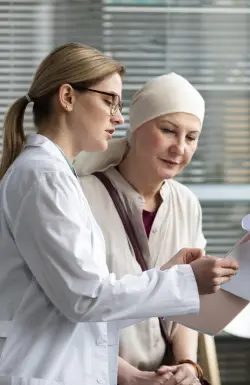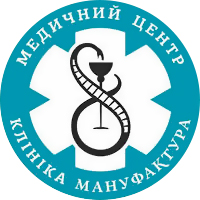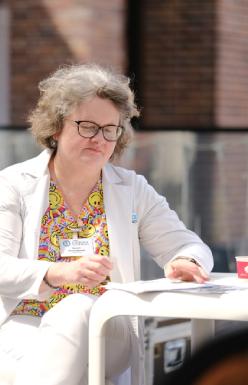
About chemotherapy in cancer treatment
Chemotherapy is one of the stages of cancer treatment. In some cases, the only possible. In some it is auxiliary, but by no means secondary.
The success of the therapy depends on many factors, where the effectiveness of the actual medication is not in the first place. The efficiency is often achieved by the choice of combination of medicines, their doses, frequency, periodicity and duration of treatment courses, and not in the last point depends on the timely correction of the treatment in view of the tumor sensitivity to the provided therapy, and also medical support of the body's endurance for chemotherapy intake.
This whole complex of these tasks faces the doctor in each, very individual case. After all, despite the fact that the disease is the same, but its stage and the human body are different in each case. That is why one treatment process differs from another even with the same diagnoses.
How long lasts chemotherapy
The amount of courses, duration of a single course as well as the duration of the whole chemotherpy are subjects of the doctor's decision after the correct diagnose is established and assessed along with the effectiveness of the previous treatment measures.
In most cases the chemotherapy course is prescribed once a week or once per three weeks. In certain cases chemotherapy lasts few days along and then goes a long break of several weeks.
How chemotherapy goes
Chemotherapy medicines can be taken as a pills or infusionally. Sometimes a therapy course consists of a combination of both - the infusion in the begining of course and the pills in further next days of treatment. The method of medication intake does not affect its performance but only the speed of its «delivery» to the necessary tissues and also depends on active agent citostatic feature.
If the chemotherapy is provided infusionally, we obligatory use infusomate. This is a medical device that controls the precise time of infusion duration. The medicine is supplied to the infusomate by the personnel, which is specially trained for chemotherapy provision. It is not demanded to stay inpatiently round-the-clock during chemotherapy infusions. If you are feeling good during therapy and overtaking it well, you may go home exact after the provision.
Your oncologist observes you within the each chemotherapy course. He may prescibe laboratory tests and additional instrumental examinations (like X-rays, gastroscopy, colonoscopy, ultrasound or CT) to assess your condition.
The effectiveness of chemotherapy is judged only basing on the results of additional instrumental examinations and specialized laboratory tests. Side effects, that you may have during chemotherapy, are taken to attention only for correction of the distinct course prescibtions as well as applying the supportive and palliative therapy. The side effects themselves as well as their intensivity or absence do not determine the efficiency and effectiveness of the chemotherapy treatment at all.
More about side effects of the chemotherapy learn in our article «How the chemotherapy affects the body».
What is port-systems?
The prot-system is the special central venous catheter which is placed under the patient's skin (usually, subclavian to the jugular vein). It is settled once by the surgions only and shall be removed also surgically after the completion of the treatment. The correctnees and success of port-system placement is controlled by X-ray.
Port-systems completely eliminate discomfort during the infusion method of chemotherapy, because there is no need to make a constant punctures of peripheral veins and there are no unpleasant sensation from long-term drips. Additional advantages of using port-systems for venous access are the painless taking of a blood test and absolute no discomfort from the system itself, and it also allows you to keep your usual daily routine (taking a shower, swimming).
Infusions provision through port systems requires compliance with certain severe rules so the hospital pays special attention to distinct personnel training and control.
Is chemotherapy painful?
Chemotherapy through peripheral veins causes a feeling, as with any other injection. There are no other pain sensations. If you feel significant pain when the medicine is injected, notify the manipulation nurse about it.
Can you take vitamins and other medications during chemotherapy?
Any intake of medications, dietary supplements, herbal tinctures or vitamins both related to cancer treatment or related to other diseases and conditions must be strictly coordinated with the attending physician or oncologist. During you first visit to the oncologist and before starting chemotherapy, it is important to tell the doctor about all the medicines that you are taking or have taken for a long time, regardless of the disease. This requirement is due to the fact that there are a number of active components that affect chemotherapy medicines and can impact the its effectiveness or your health.
When visiting other doctors, including ophthalmologists or dentists, inform them that you are undergoing chemotherapy. And when they prescribe medicines, inform the attending physician about their appointment.
How the lifestyle changes during chemotherapy
Chemotherapy makes adjustments to the patient's well-being. Even in the absence of intense side effects, patients often feel tired or weak. The patient should rest when he feels tired. To maintain a good psychological state during treatment, doctors recommend continuing to work and remain active within reasonable limits. You can consult your doctor about working hours or physical activity, its intensity and duration. In any case, the main indicator of readiness for exercise should be your physical well-being.
Make an appointment
Your name
Phone number
Direction
Desired date
Comment













